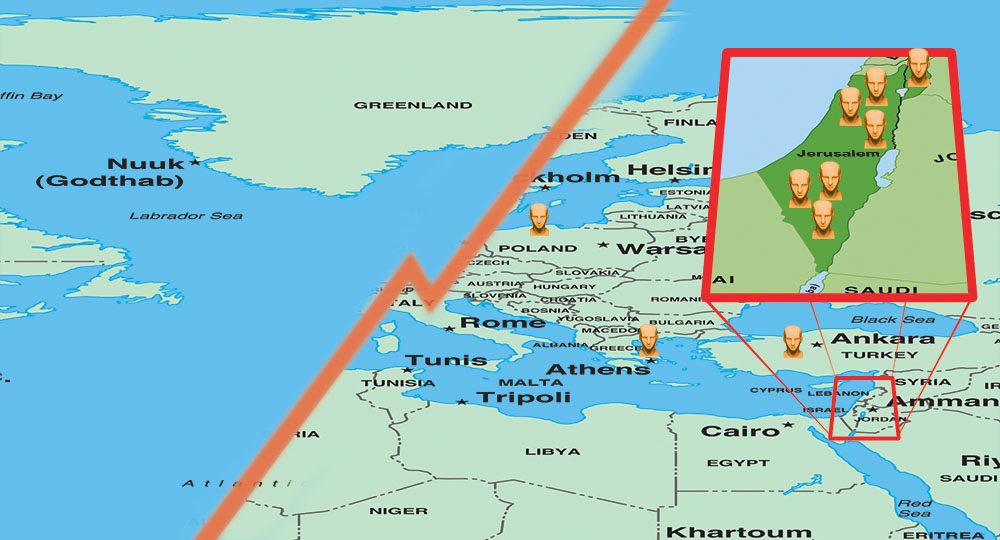Jewish Pseudo Messiahs
For many will come in My name, saying, “I am the Christ,” and will deceive many (Mt. 24:5).
History is filled with people who envisioned themselves to be greater than they really were. Here are a number of Jewish men who either saw themselves as God’s promised Redeemer or who were touted as such by their followers. None met the biblical criteria.
In the Land
Theudas (died A.D. 46) is mentioned in Acts 5:36. He led his followers to the Jordan River, promising to divide the water by his word. A Roman cavalry attacked. Theudas’s head went on display in Jerusalem as a victory trophy (Josephus Antiquities of the Jews 20.5.1).
Judas of Galilee (A.D. 6) is mentioned in Acts 5:37. Ten years before Jesus, Judas led a tax revolt. The Romans crushed the movement and killed him. He founded the Zealots (Antiquities 18.1.6; 20.5.2).
A Jewish Egyptian is mentioned in Acts 21:38. To attack the Romans in Jerusalem, he brought his followers to the Mount of Olives, promising the walls would fall by his word; but he fled before the Romans (Josephus War of the Jews 2.13.5).
Simon of Peraea (c. 4 B.C.) was a former slave of Herod the Great. He crowned himself king of the Jews and led a revolt but was captured. His head was cut off (Antiquities 17.10.6).
Athronges the shepherd (c. 4 B.C.) crowned himself king and led an insurrection against Archelaus and the Romans. As expected, they were defeated (Antiquities 17.10.7).
“A certain impostor” (c. A.D. 59) promised his followers freedom from all their miseries. As they traveled into the wilderness, the Romans attacked. Freedom came by death (Antiquities 20.8.10).
Shimon Ben-Kosiba (died A.D. 135) is remembered as the messiah-like leader of the second Jewish revolt against Rome. A rabbi named him Bar Kokhba, “son of a star,” based on Numbers 24:17. After the Romans crushed him, the Jewish community gave him a new name: Bar Kozeba, “son of disappointment.”
Outside the Land
“Moses of Crete” (A.D. 448) viewed himself as Moses in Exodus. He promised to lead his followers through the Mediterranean and back to Israel. At his command many cast themselves into the sea, believing it would divide before them. Nearby fishermen desperately tried to rescue the perishing. Many drowned. The wannabe Moses was never heard from again.
David Alroy (c. 1147) fooled people by performing “miracles.” His goal was to be king of a liberated Jerusalem. While planning an attack, his group was ambushed. Alroy got his head lopped off and sent to the Baghdad sultan as a prize.
Sabbatai Zevi (1626–1676) said a voice told him he was the Messiah. His teachings were not received. Then an individual claiming to be a reincarnation of Elijah began to promote him. Sabbatai’s influence took off. But he was discredited when he embraced Islam. He was appointed as the sultan’s door-keeper. Eventually he was banished to Constantinople and died there in isolation.
Jacob Frank (1726–1791) claimed to be the reincarnation of King David and Sabbatai Zevi. To him, salvation was through a mixture of Christian -ity, Judaism, and Sabbataism, which he called the “religion of Edom.” He lived in wealth until his death in 1791. His daughter became the “holy mistress” and leader of the sect.
Menachem Mendel Schneerson (1902–1994) was the spiritual leader of the Chabad Lubavitch (ultra-Orthodox) movement in New York City. Before his death, members believed he would announce his messiahship. He never did. Yet many books and pamphlets have been written as “proof” of his status as Judaism’s Messiah.







